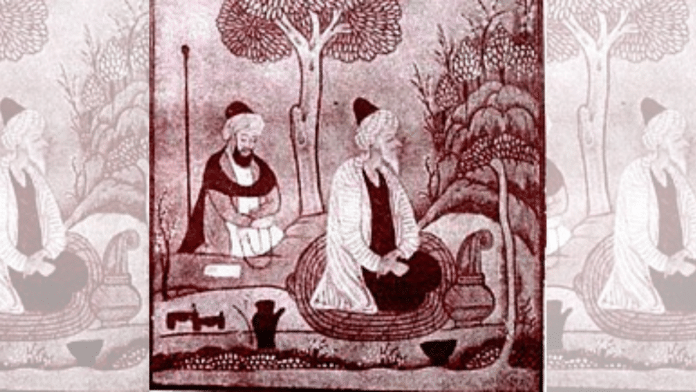Thank you dear subscribers, we are overwhelmed with your response.
Sheikh Noor-ud-Din Wali (RA), also known as Nund Rishi, holds an unparalleled
position in the cultural, spiritual, and social history of Kashmir. Born in 1377 CE in the village of Qaimoh, near the town of Kulgam, Sheikh Noor-ud-Din Wali is revered as the founder of the Rishi order in Kashmir, a unique spiritual movement blending Sufi and indigenous traditions. His teachings, poetry, and philosophy have not only shaped the spiritual fabric of Kashmir but also emphasized the core values of humanity, coexistence, and respect for nature, leaving an indelible mark on the region’s identity.
Sheikh Noor-ud-Din’s teachings revolved around simplicity, self-reliance, and devotion
to God. His poetry, composed in Kashmiri, resonates deeply with the common people and
addresses social justice, moral values, and a critique of materialism. He encouraged a life rooted in compassion, spirituality, and harmony with nature.
The Rishi order, inspired by his philosophy, became a bridge between diverse communities in Kashmir. It fostered tolerance and mutual respect, creating a culture of pluralism that characterized the valley for centuries. His legacy is celebrated through his verses, still
recited in Kashmiri households, and through shrines like Charar-e-Sharief, a site of pilgrimage for people across religious lines. The decision to remove Sheikh Noor-ud-Din Wali from school textbooks in Jammu and Kashmir under the BJP-led administration has sparked widespread shock, discontent and debate. This as an attempt to undermine the region’s syncretic history and impose a homogenized cultural narrative, sidelining the pluralistic traditions that have defined Kashmir for centuries.
By excluding figures like Sheikh Noor-ud-Din from educational curricula, authorities risk
alienating Kashmiris especially the youth from their rich cultural heritage. Such actions part of broader efforts to reshape the socio-political identity of the region following the abrogation of Article 370 in 2019. This erasure of iconic figures reflects a disregard for the region’s unique historical and spiritual legacy.
The removal of Sheikh Noor-ud-Din from textbooks is not merely a curricular change; it
is perceived as an assault on the ethos of Kashmiriyat, the cultural and spiritual synthesis that has bound the valley’s communities together. It also raises concerns about the future of the Rishi-Sufi tradition, which has been a cornerstone of Kashmir’s identity for centuries.
For the people of Kashmir, the teachings of Sheikh Noor-ud-Din are more than historical
artifacts—they are a source of resilience and a reminder of the values that can help the region navigate its challenges. The attempt to erase such figures from public memory risks further alienating communities already grappling with political and social upheavals.
Sheikh Noor-ud-Din Wali’s legacy is a testament to the enduring power of spirituality,
compassion, and coexistence. Any attempt to diminish his role in Kashmir’s history undermines the cultural diversity and richness of the region. At a time when polarization and cultural homogenization threaten to overshadow pluralistic traditions, preserving the legacy of figures like Sheikh Noor-ud-Din Wali is not just a matter of historical accuracy but a commitment to the ideals of unity and mutual respect that he so passionately advocated.
The silence of the literary and intellectual community regarding the removal of Sheikh
Noor-ud-Din Wali (Nund Rishi) from textbooks in Kashmir is indeed deeply troubling. As one of the most revered figures in Kashmiri history, his teachings represent not just spiritual guidance but also the essence of Kashmir’s syncretic and pluralistic heritage. To erase his contributions from educational narratives is to deny a foundational part of the region’s cultural identity.
This issue demands an active response from the literary community, both within and
beyond Kashmir. Writers, poets, historians, and intellectuals have a moral responsibility to
safeguard cultural heritage, especially in times when it faces the risk of erasure. Silence in the face of such actions can be interpreted as complicity, or at the very least, a lack of commitment to preserving the diversity and richness of regional histories. By not addressing this issue, the literary community risks enabling the dilution of Kashmir’s unique history and ethos, which are grounded in the teachings of figures like Sheikh Noor-ud-Din Wali. Intellectuals are often seen as the guardians of culture and history. Their
inaction in the face of such moves could undermine their credibility as stewards of truth and justice. Education is a powerful tool in shaping young minds.
The removal of Noor-ud-Din Wali from textbooks deprives students of learning about a figure who championed values of peace, humility, and harmony—qualities essential in today’s fragmented world. The literary community’s silence highlights a broader issue: the increasing politicization of education and cultural narratives. It is essential for writers, poets, and artists to rise above political affiliations and advocate for the preservation of cultural legacies. The current silence is a disservice to the values Sheikh Noor-ud-Din Wali stood for, as well as to the generations that will grow up disconnected from their heritage.
The literary community must break this silence and take a stand, not just for Kashmir’s past, but for its future. Cultural erasure is a form of violence, and to remain passive in its face is to allow that violence to persist. A collective, vocal, and sustained effort to resist such erasures is not merely an act of defiance—it is a duty to preserve the soul of Kashmiriyat, which figures like Sheikh Noor-ud-Din Wali so profoundly embodied.
These pieces are being published as they have been received – they have not been edited/fact-checked by ThePrint.


